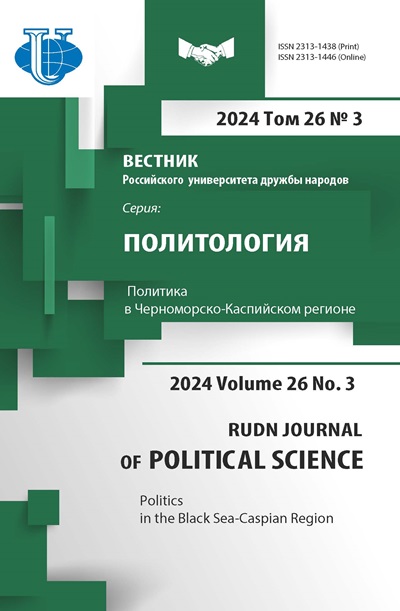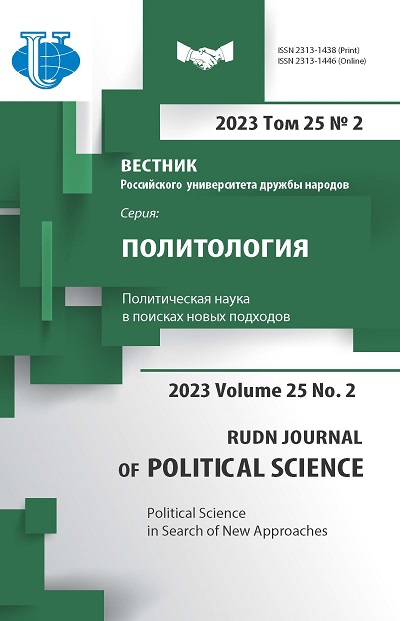New dilemmas of the «just war» theory
- Authors: Shanchenko E.P.1,2,3
-
Affiliations:
- Primakov National Research Institute of World Economy and International Relations (IMEMO), Russian Academy of Science
- Moscow State Institute of International Relations (MGIMO)
- Sechenov University
- Issue: Vol 25, No 2 (2023): Political Science in Search of New Approaches
- Pages: 319-329
- Section: IN SEARCH OF THE THEORETICAL FRAMEWORK OF THE POLITICAL
- URL: https://journals.rudn.ru/political-science/article/view/35153
- DOI: https://doi.org/10.22363/2313-1438-2023-25-2-319-329
- EDN: https://elibrary.ru/ZCYKIU
Cite item
Full Text
Abstract
Referring to the classical tenets of the “just war” theory, the author also analyses its modern versions. While the research the author arrives at the conclusion that some political scientists have modernized the theory of “a just war” according to the modern times. For instance, due to the existence of new actors on the international arena, there were created a new version, which allows to include non-state actors for the analysis (which consequently led to abolition of such principles as legitimacy of authorities, “last resort” criteria and also led to the implementation of the preventive actions) as well as the principles just post bellum. It is interesting to note that some political scientists associate the theory of “a just war” with the issue of global leadership of the USA. Throughout the history the participants and the aims of the wars have undergone serious changes, so that nowadays they do not sound “just” (for example, theory of punitive war). Analyzing in detail the postulates of the theory of “just war”, the author turns to historical events - the “Arab Spring”, the confrontation between the USA and the USSR, modern information wars. The author arrives at the conclusion that the use of the theory of “just war” for the analysis of modern events remains relevant, however, requires the introduction of new postulates in the norms of the theory, in particular, the addition of the principles of jus ad bellum and jus post bellum.
About the authors
Ekaterina P. Shanchenko
Primakov National Research Institute of World Economy and International Relations (IMEMO), Russian Academy of Science; Moscow State Institute of International Relations (MGIMO); Sechenov University
Author for correspondence.
Email: shanchenkoep@gmail.com
ORCID iD: 0009-0004-1522-3589
Junior researcher, Institute for International Studies, Moscow State Institute of International Relations (MGIMO); senior lecturer Institute of Linguistics and international communications, Sechenov University; PhD applicant, Primakov National Research Institute of World Economy and International Relations (IMEMO) Russian Academy of Science
Moscow, Russian FederationReferences
- Amini, A.R. (2021). The reasons for the failure of the US + NATO mission in Afghanistan and the forecast of the situation in the country under the “new regime”. PolitBook, (3), 99–109 (In Russian) http://doi.org/10.17976/jpps/2020.05.09
- Bugrov, K.D., & Loginov, A.V. (2020). Back to the subject: Theories of just war in contemporary political thought. Polis. Political Studies, (5), 114–129. (In Russian)
- Demidov, K.B. (2023). The Arab East: The end of neoliberalism. What’s next? Information and analytical journal of INION RAS Social and Humanitarian Sciences. Domestic and foreign
- literature. Ser. 9. Oriental studies and African studies, (1), 38–62. (In Russian) Fotion, N. (2016). Two theories of a just war. Ethical Thought, 16(2), 169–186.
- Kaldor, M. (1999). New and old wars: Organized violence in a global era. Stanford, California: Stanford University Press, 1999.
- Kashnikov, B.N. (2019). The theory of a just war: A critique of the basic principles. Ethical Thought, 19(2), 152–167. (In Russian)
- Kashnikov, B.N. (2020). Global sovereignty and moral degradation of war. Voprosy Filosofii, (2), 14–25. (In Russian)
- Kumankov, A. (2019). Philosophy of war. A brief history. Logos, 29(3), 99–116. (In Russian)
- MacMahan, J. (2006). The ethics of killing in war. Philosophia, 34(1), 23–41. http://doi.org/10.1007/ s11406-006-9007-y
- McMahan, J. (2019). Rethinking “a Just War”. Logos, 29(3), 139–156. (In Russian)
- Sidorenko, I.N. (2020). The phenomenon of “just war” and its transformation in the modern world. Proceedings of BSTU. Series 6: History, philosophy, (1), 116–120. (In Russian)
- Sidorov, A.Yu., & Fradkova, V.I. (2023). The doctrine of “regime change” in the American foreign policy tradition and ideology. Obozrevatel — Observer, (1), 17–29. (In Russian)
- Walzer, M. (1977). Just and unjust wars. A moral argument with historical illustrations. New York, 1977.
- Walzer, M. (2019). The triumph of the theory of just war (and the danger of success). Logos, 3, 117–138. (In Russian)
















